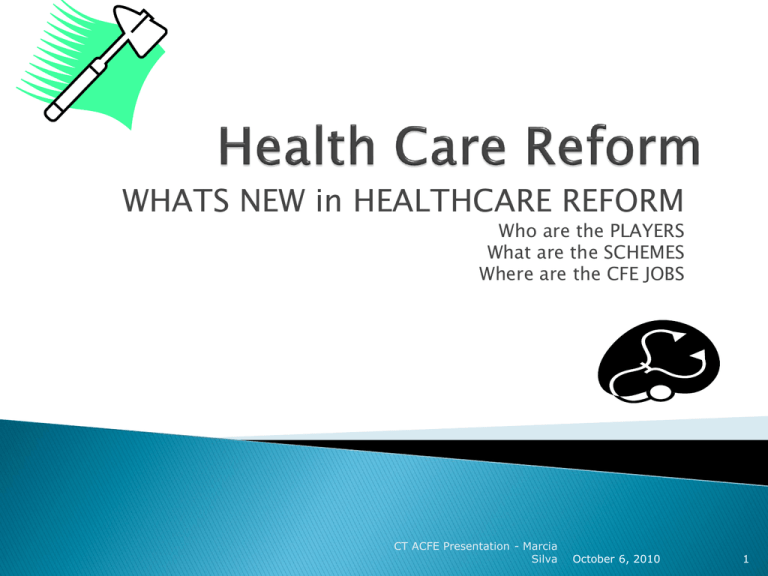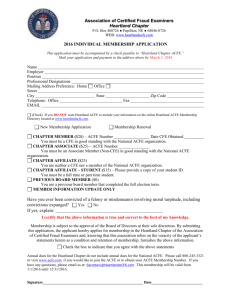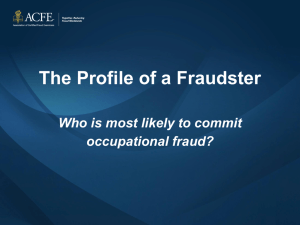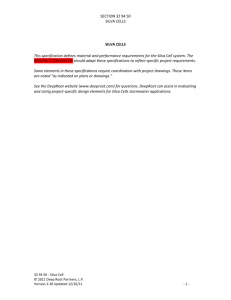Health Care Trends
advertisement

WHATS NEW in HEALTHCARE REFORM Who are the PLAYERS What are the SCHEMES Where are the CFE JOBS CT ACFE Presentation - Marcia Silva October 6, 2010 1 Fraud, waste and abuse takes an enormous toll on government budgets. More than $98 billion was lost to improper payments in fiscal year 2009 alone, according to the Federal Office of Management and Budget. . CT ACFE Presentation - Marcia Silva October 6, 2010 2 Fraud Fraud is the intentional deception or misrepresentation made by a person with the knowledge that the deception could result in some unauthorized benefit to themselves or someone else. It includes any act that constitutes fraud under applicable federal or state laws. Abuse Abuse includes incidents or practices of providers that are inconsistent with sound fiscal, business or medical practices, and result in an unnecessary cost to the Medicaid Program, Immunization Program, or a health insurance company. Abuse also includes reimbursement for services that are not medically necessary or that fail to meet professionally recognized standards for health care. CT ACFE Presentation - Marcia Silva October 6, 2010 3 Payments made through Medicare/Medicaid/private insurers are made through codes (RUGs, HCPCS, ICD9, Revenue Codes, DRGs) National Coverage Determinations, Local Coverage Determinations This creates opportunity! Pay and Chase – Postpay review of claims Review of Red Flags on Applications Edits in systems to stop payments Data Analysis – Peer Analysis – Tips – Whistleblowers – Recipients - Complaints CT ACFE Presentation - Marcia Silva October 6, 2010 4 The new healthcare reform law places a heavy emphasis on the increased use of information technology (IT) to improve the American healthcare system. With new technology means greater opportunity for fraud! CT ACFE Presentation - Marcia Silva October 6, 2010 5 The law identifies health information technology as a substantial part of mandates for coordination of care for the chronically ill, development of the patient-centered medical home care delivery model and the advancement of telehealth, particularly patient monitoring. CT ACFE Presentation - Marcia Silva October 6, 2010 6 Also, since the health reform bill will bring millions of new consumers into the system, the reform law will foster changes in marketwide guidelines and individual state regulations governing health information exchanges. CT ACFE Presentation - Marcia Silva October 6, 2010 7 Penalties New penalties for willful neglect of compliance are mandatory and start at $10,000 Minimum. The HITECH Act within the American Recovery and Reinvestment Act of 2009 (ARRA) includes a number of changes to how the HIPAA regulations will be enforced and the penalties that will be applied. HIPAA can now apply directly to individuals in cases of wrongful disclosure. Add to this the fact that HIPAA compliance will now be actively audited by the Department of Health and Human Services Office for Civil Rights (OCR), and full compliance with HIPAA becomes a very serious issue. Self-auditing your HIPAA compliance before OCR does it for you is now an essential part of the avoidance of these penalties. The icing on the cake is that now state attorneys general can now also bring civil action in federal court under HIPAA. CT ACFE Presentation - Marcia Silva October 6, 2010 8 HIPAA violation lands an employee federal prison time; Red Flag rules a go for June 1. When training staff about the dangers of accessing people’s medical records without a legit reason, you might cite a recent case as a cautionary tale. A hospital researcher recently received a four-month federal prison sentence for looking at patients’ medical records that didn’t apply to his line of work. The former employee at the UCLA School of Medicine accessed patient records at the hospital over 300 times during a three-week period, mostly to peek at the private health records of celebrities, according to a Department of Justice release. In his plea agreement, the employee “acknowledged that at the time he viewed these patients’ medical information, he had no legitimate reason, medical or otherwise, for obtaining the personal information,” the DOJ says. The DOJ investigators did not find any evidence that the employee attempted to use or sell the information that he accessed – he apparently sought the information out of curiosity. CT ACFE Presentation - Marcia Silva October 6, 2010 9 Incentives are given for the use of EHRs but there are also issues: Cloning – copy and paste function (from one record to the next (did it happen?) Approval – who is creating the record, approving the actions taken (signature authentication.) How does it impact fraud investigators CT ACFE Presentation - Marcia Silva October 6, 2010 10 Identity Theft –Beneficiary (role of SMP) (picture IDs need to be shown) ID Theft – Provider Level Duplicate Billing – Systems not talking to each other – Medicaid/Medicare/Privates CT ACFE Presentation - Marcia Silva October 6, 2010 11 Reading your EOB Double Billing Mary J. visited her primary care physician (PCP) and had a chest X-ray because of a chronic cough. Her PCP sent the X-ray to a radiologist to be read. The following month Mary got her EOB and a bill from the radiologist. When she looked at her EOB she noticed that both her PCP and the radiologist billed her insurance company to read the X-ray. The insurance company rejected the claim from the radiologist. CT ACFE Presentation - Marcia Silva October 6, 2010 12 Disgruntled employees Bad Suppliers Family members Billing Companies Career Criminals Organized structure groups CT ACFE Presentation - Marcia Silva October 6, 2010 13 Wrong Diagnosis or Procedure Betsy D. went to her PCP for a sore throat. When she received her EOB she noticed that instead of billing for a throat culture, her doctor’s office had mistakenly billed for a diabetes blood test. The computer program used by her doctor’s billing company automatically put down a diagnosis of diabetes, which Betsy does not have. Although there may be no financial mistake, Betsy very wisely called her health plan and doctor’s office to correct the diagnosis error. In the future, if she wanted to purchase health insurance, she could be denied because she had been diagnosed with diabetes. Or, if not denied, a new health plan could impose a pre-existing condition waiting period CT ACFE Presentation - Marcia Silva October 6, 2010 14 1-800 – Medicare (1-800-633-42273) SMP ( Senior Medicare Patrol) Dept of Public Health (www.ct.gov/dph) HHS OIG - Phone: 1-800-HHS-TIPS (1-800-447-8477) Fax: 1-800-223-8164 Mail: Office of Inspector General Department of Health and Human Services ATTN: HOTLINE PO Box 23489 Washington, DC 20026 CT ACFE Presentation - Marcia Silva October 6, 2010 15 Miscalculating Your Coinsurance Amount Max had outpatient surgery on his hand. He is in a PPO and he pays a coinsurance of 20% for outpatient procedures. Following the surgery, he was sent a bill from the surgeon’s billing company for $1000, 20% of the surgeon’s $5000 bill. However, when Max received his EOB, he noted that although the surgeon billed $5000, he was paid only $3000 by his health plan. Max did the math and figured that he should be paying 20% of $3000, not 20% of $5000. His health plan confirmed that was correct and he was able to pay out $600 instead of $1000. CT ACFE Presentation - Marcia Silva October 6, 2010 16 The U.S. Department of Health & Human Services manages a robust website intended to inform consumers about the new law: HealthReform.GOV The Obama Administration has created a website which aims to explain the new health reform law: Health Reform: What It Means To You CT ACFE Presentation - Marcia Silva October 6, 2010 17 ZPIC Contractors (Zone Program Integrity Contractors) (Investigators, MAC Contractors (Pay Medicare Claims) RAC Contractors -Recovery Audit Contractors are paid by percentage for what they find – bounty hunters) medical reviewers, data analysts) Region A: Diversified Collection Services Region B: Region C: CGI http://racb.cgi.com Connolly, Inc. www.connollyhealthcare.com Region D: HealthDataInsights www.dcsrac.com http://racinfo.healthdatainsights.co CT ACFE Presentation - Marcia Silva October 6, 2010 18 MIC Contractors (Review MICS) (analyze Medicaid claims data) Who are they (Advance Med Corporation; ACS Healthcare Analytics, Inc.; Thomson Reuters; Safeguard Services, LLC; and IMS Government Solutions) MIC Contractors (Audit MICS) (conduct post-payment audits of all types of Medicaid providers) Who are they: (Booz Allen Hamilton; Fox Systems, Inc.; IPRO; Health Management Systems; and Health Integrity, LLC) MIC Contractors (Education MICS) (work with the Review and Audit MICS to educate health care providers and state Medicaid officials; Who are they: Information Experts; and Strategic Health Solutions) CT ACFE Presentation - Marcia Silva October 6, 2010 19 Federal Law Enforcement (CMS,HHS-OIG, FBI (analysts, investigators, Dept of Treasury, Postal Service)) State law enforcement (Chief States Attorney, Attorney General, MFCU) State Regulatory Agencies (DMHAS, DSS, DPH) CT ACFE Presentation - Marcia Silva October 6, 2010 20 Contact Information: Marcia Silva, CFE, AHFI 860-622-4800 Marcia.Silva@hp.com CT ACFE Presentation - Marcia Silva October 6, 2010 21







